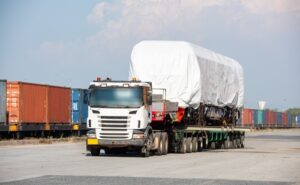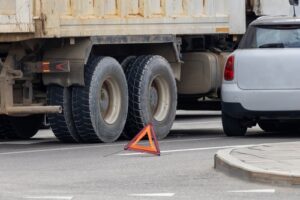Why Are Oversized Trucks So Dangerous?
Why Are Oversized Trucks So Dangerous?
Oversized trucks are dangerous because their immense size and weight create physical forces that regular traffic laws and vehicle standards do not contain. A fully loaded semi-truck needs up to 40% more distance to stop than a passenger car, a gap that grows with overweight loads.
These vehicles operate under multiple regulatory requirements including special permits, route limitations, and safety protocols. When trucking companies, drivers, or cargo loaders cut corners on these rules, even slightly, the risk of a catastrophic accident increases dramatically, and a Tampa truck accident lawyer can help hold the responsible parties accountable.
Fatal crashes involving large trucks have been on a concerning upward trend, and a significant portion of those killed are occupants of other vehicles.
After a collision, you have the right to pursue compensation for your medical bills, lost income, and the disruption to your life. If you have a question about an accident involving an oversized or wide-load truck, call us for a no-cost consultation at (813) 445-8161.
Table of Contents
ToggleKey Takeaways for Oversized Truck Dangers
- Oversized trucks pose serious threats due to extreme size and weight, which affect stopping distances, blind spots, and vehicle control—especially when routes, cargo, or equipment are mishandled.
- Strict rules govern their operation, including permits, escort vehicle requirements, and route limitations. Violations of these rules by drivers, companies, or cargo handlers frequently cause preventable accidents.
- Multiple parties may be liable after a crash, not just the driver. Liability can extend to trucking companies, shippers, escort services, and maintenance shops depending on how the system failed.
The Physics Problem: How Extreme Size and Weight Rewrite the Rules of the Road

Federal law sets a gross vehicle weight limit of 80,000 pounds for the Interstate System, but special permits allow trucks to weigh far more. This weight creates immense momentum, and when safety rules are ignored the results can be devastating, which is why you should hire a truck accident attorney to protect your rights and pursue full compensation.
This leads to several distinct dangers that drivers in passenger vehicles are unprepared for:
- Unforgiving Stopping Distances: A heavier truck requires a much longer runway to come to a complete stop. A fully loaded tractor-trailer moving at 65 miles per hour takes 525 feet to stop, nearly the length of two football fields. In a sudden traffic change, the truck driver may have no way to avoid a rear-end collision.
- Dangerous Blind Spots: The sheer length and height of these trucks create massive “no-zones” on all four sides. An oversized load blocks even more of the driver’s view, making it impossible for them to see a smaller vehicle beside them.
- The Rollover Threat: A high center of gravity, especially with tall or unstable cargo, makes these trucks susceptible to tipping over in high winds or on sharp turns.
- “Off-Tracking” on Turns: When a long truck makes a turn, the rear wheels follow a shorter path than the front wheels. An oversized truck needs even more room, swinging into adjacent lanes and catching cars in the turn.
- Powerful Wind Gusts: The large, flat surfaces of an oversized load act like a sail, pushing the truck unexpectedly into another lane, a particular hazard in adverse weather.
What Does “Oversized” Actually Mean?
The term “oversized” (or “overweight”) is a specific legal classification. A commercial vehicle becomes “oversized” when it exceeds the standard legal dimensions or weight limits set by law. While federal law establishes the baseline, each state, including Florida, has its own specific regulations and permitting process for allowing these vehicles on its roads.
What is a special permit?
It’s a document issued by the state that allows a truck to operate outside normal limits. It is typically required for loads that are “non-divisible,” meaning they cannot be broken down into smaller, lighter pieces. Think of it as a contract: the state grants permission to use public roads in exchange for the trucking company following a strict set of safety rules, and if those rules are broken you may need a truck accident lawyer to hold them accountable.
What kinds of rules do these permits include?
Permits come with stringent conditions designed to mitigate the risks these massive loads create. These typically include:
- Route Restrictions: The permit dictates the exact roads the truck must use, chosen to avoid weak bridges, low overpasses, or sharp turns. The federal bridge formula is used to calculate weight limits to protect this infrastructure.
- Time-of-Day and Day-of-Week Limits: To minimize risk to other drivers, most oversized loads in Florida are restricted from traveling during peak traffic hours, at night, or on holidays.
- Pilot or Escort Vehicle Requirements: Depending on the size of the load (for example, wider than 12 feet in Florida), one or more escort vehicles may be required to travel in front of and/or behind the truck to warn other drivers.
- Mandatory Safety Equipment: These trucks must be equipped with specific signage, such as “Oversize Load” banners, along with special flags and warning lights to make them more visible.
A System of Failures: Where Do Things Go Wrong?
Accidents involving oversized trucks are frequently the result of a predictable failure in the chain of safety procedures designed to protect the public, and several parties may be liable for a truck accident when those safeguards are ignored.
Was the cargo loaded and secured correctly?
An improperly balanced or secured load may shift during transit, causing the driver to lose control or, in the worst cases, spill heavy materials onto the roadway. The company that loaded the cargo may be just as responsible as the one that transported it.
Was the driver following the permit’s rules?
A common finding is that the driver took a “shortcut” off the approved route to save time. This deviation places a dangerously heavy or wide truck on a road not designed to handle it. Other violations include driving outside of permitted hours or failing to maintain the correct speed, a factor in about a quarter of all large truck crashes.
Were the required pilot cars present and doing their job?
Sometimes the permit requires escort vehicles, but the trucking company neglects to hire them to save money. Other times, the escort drivers are not properly trained or fail to communicate hazards to the truck driver. When these support systems fail, the risk to other motorists increases significantly.
Was the driver qualified for this specific load?
Hauling an oversized load requires a high level of skill and experience. A trucking company that assigns a new or unqualified driver to such a complex task is creating an unacceptable risk. This is particularly true when combined with driver fatigue, a persistent issue in the industry that impairs reaction times and decision-making.
Was the truck itself safe to be on the road?
The immense weight of an oversized load puts extreme stress on brakes, tires, and suspension systems. A failure to perform rigorous, documented maintenance leads directly to equipment failure and a resulting collision. Nearly 30% of all large truck accidents involve some form of mechanical failure.
Proving that one of these failures occurred is how you demonstrate negligence. It shifts the focus from a simple “accident” to a clear case of a company or driver failing to meet their legal duty to keep others safe. Our role is to immediately begin investigating every one of these possibilities. We secure the driver’s logs, the permit records, the maintenance history, and other evidence needed to uncover the true cause of the crash.
The Chain of Responsibility: Who May Be Held Liable?

After an accident with an oversized truck, it is a mistake to assume the driver is the only responsible party. The law recognizes that multiple parties may have contributed to the incident, a concept known as vicarious liability. Simply put, this legal idea holds an employer responsible for the actions of their employee when a truck causes an accident.
Our investigation focuses on identifying every person or company in the chain of responsibility to ensure you may pursue compensation from all available sources. This may include:
- The Truck Driver: For direct actions like speeding, distracted driving, or violating the terms of the travel permit.
- The Trucking Company (Motor Carrier): For its role in hiring an unqualified driver, encouraging drivers to violate hours-of-service rules, or failing to maintain its fleet of vehicles.
- The Cargo Owner or Shipper: If they were responsible for improperly loading, balancing, or securing the cargo onto the truck.
- The Broker: A third-party logistics company that may have connected the shipper with a trucking company known to have a poor safety record.
- The Pilot or Escort Vehicle Company: If their drivers failed to provide adequate warning to other motorists or failed to communicate properly with the truck driver.
- A Maintenance or Repair Facility: If their substandard work on the truck’s brakes, tires, or other systems contributed to a mechanical failure.
What to Know About Your Rights and Options in Florida
Florida’s Comparative Fault Rule
The insurance company for the truck may try to argue that you were partially to blame for the accident to reduce the amount they have to pay. Florida law allows for this.
Under the state’s modified comparative negligence standard, your compensation is reduced by your percentage of fault, and if you are found to be more than 50% at fault, you do not recover any damages. Our job is to build a case that clearly demonstrates the fault of the other parties and protects you from unfair blame.
The Deadline to File a Lawsuit
In Florida, you generally have a limited amount of time from the date of an accident to file a personal injury lawsuit. This is known as the statute of limitations, which for most negligence cases is now two years. While it may seem like a long time, building a strong case against a commercial trucking operation takes a great deal of time and investigation.
Available Compensation
A successful claim provides compensation for more than just your immediate medical bills. You may also recover funds for future medical care, lost wages, diminished earning capacity, and for the pain and suffering the accident has caused.
Frequently Asked Questions About Oversized Truck Dangers
Is it possible to sue the government if a dangerous road condition contributed to the crash?
In some cases, yes. If a poorly maintained road, missing signage, or a dangerous intersection design was a factor, it is possible to file a claim against the responsible government entity in Florida. However, these cases have unique rules and shorter deadlines under the Florida Tort Claims Act.
What if the truck that hit me was from out of state?
That doesn’t change your rights. A trucking company that operates in Florida must follow both federal and Florida state laws. We handle cases involving interstate trucking companies regularly.
The trucking company’s insurance adjuster has already called me. What should I do?
You are not obligated to provide a recorded statement. It is best to politely decline and speak with a lawyer first. The adjuster’s role is to protect their company’s financial interests, and a statement may be used against you later.
How much does it cost to hire Boohoff Law?
We handle personal injury cases on a contingency fee basis. This means you pay us nothing upfront. We only receive a fee if we successfully recover compensation for you.
Why is acting quickly so important?
Evidence disappears. The truck may be repaired, electronic data from its “black box” may be erased, and witness memories fade. Starting the investigative process quickly helps preserve key evidence.
Let Us Handle the Legal Process
 We understand the rules that govern oversized trucks in Florida and across the country. Our practice is focused on holding negligent companies accountable when their failures cause harm.
We understand the rules that govern oversized trucks in Florida and across the country. Our practice is focused on holding negligent companies accountable when their failures cause harm.
If you’re ready to discuss your situation, we are here to listen. Call Boohoff Law, P.A today at (813) 445-8161.
Free Consultation
We Are Here For You 24/7
Reviews
– Elissa M.
“Really pleased with Boohoff Law! Received immediate responses when I had any questions. Treated amazingly by all staff … made this process a true breeze!”
– Caitlyn M.
– Brandy K.
Related Posts
I Was Partially At-Fault in a Rear-End Crash. Can I Still Get Compensation in Florida?
I Was a Passenger in an Uber Accident. What Are My Rights?
What Damages Can I Recover After a Jackknife Truck Accident?
Recovery is personal.
We’re here for you.
We’re close by. And if you can’t make it to us, we’ll meet you where you need us, at home or in the hospital.
You're better off with Boohoff.











The information on this website is for general information purposes only. Nothing on this site should be taken as legal advice for any individual case or situation. This information is not intended to create, and receipt or viewing does not constitute, an attorney-client relationship.
available 24/7
(877) 999-9999
